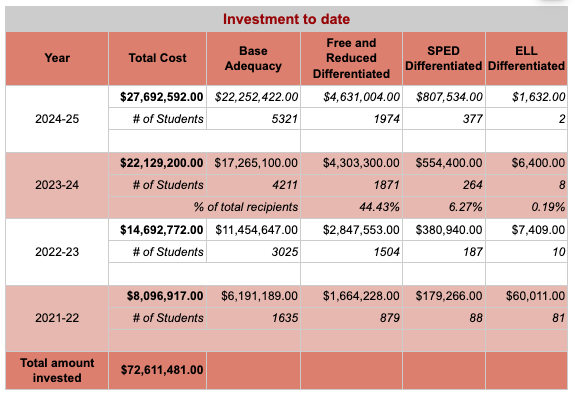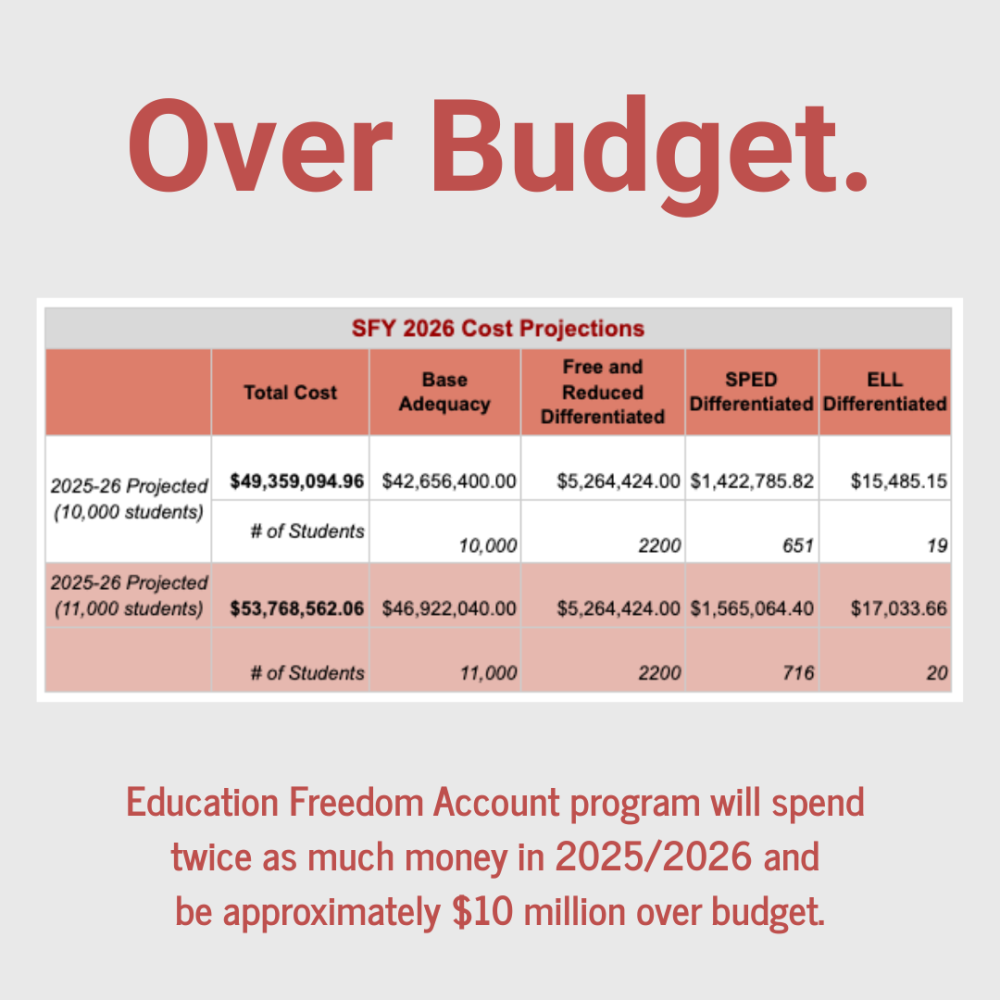School Vouchers in New Hampshire
In June 2025, Governor Kelly Ayotte signed SB 295 into law despite widespread public opposition. The move makes New Hampshire the 19th state to establish a universal school voucher system and underscores vouchers as one of the Governor’s top education policy priorities. New Hampshire created the program, known as Education Freedom Accounts (EFAs), in 2021. Modeled after similar programs in other states, EFAs are taxpayer-funded accounts that give state funding directly to parents to pay for private and religious school tuition, homeschooling expenses, educational supplies, transportation, tutoring, and other items.

Better Understand NH’s Voucher Program
Yes. A voucher, according to the Merriam-Webster dictionary, is “a coupon issued by the government to a parent or guardian to be used to fund a child’s education in either a public or private school”. Voucher is the generic term for Education Freedom Accounts.
The Education Freedom Accounts (EFAs) are administered by a third party vendor, Children’s Scholarship Fund NH (CSFNH), a New York based nonprofit. Families interested in receiving funds must submit an application to CSFNH. Once accepted, each student’s EFA amount is deposited into an account managed by the vendor. Families are able to spend that money on expenses including:
-
Tuition and fees at a private school.
-
Tuition and fees for non-public online learning programs.
-
Tutoring services provided by an individual or a tutoring facility.
-
Services contracted for and provided by a district public school, chartered public school, public academy, or independent school, including, but not limited to, individual classes and curricular activities and programs.
-
Textbooks, curriculum, or other instructional materials, including, but not limited to, any supplemental materials or associated online instruction required by either a curriculum or an education service provider.
-
Computer hardware, Internet connectivity, or other technological services and devices, that are primarily used to help meet an EFA student's educational needs.
-
Educational software and applications.
-
School uniforms.
-
Fees for nationally standardized assessments, advanced placement examinations, examinations related to college or university admission or awarding of credits and tuition and/or fees for preparatory courses for such exams.
-
Tuition and fees for summer education programs and specialized education programs.
-
Tuition, fees, instructional materials, and examination fees at a career or technical school.
-
Educational services and therapies, including, but not limited to, occupational, behavioral, physical, speech-language, and audiology therapies.
-
Tuition and fees at an institution of higher education.
-
Fees for transportation paid to a fee-for-service transportation provider for the student to travel to and from an education service provider.
-
Any other educational expense approved by the scholarship organization.
CSFNH creates and maintains approved lists of vendors. When a parent chooses a provider from the approved list, the parent submits an invoice to CSFNH for reimbursement. Every payment is reviewed by CSFNH staff for compliance with state rules.
Education Freedom Accounts (EFAs) are exclusively for New Hampshire residents who are eligible to attend a public school. Initially lawmakers limited eligibility to families with incomes at or below 300% of the federal poverty level. That cap was later lifted to 350%. On June 10, 2025, Governor Kelly Ayotte signed SB 295 into law removing the income cap altogether. The move makes New Hampshire the 19th state to establish a universal school voucher system.
Initially, EFA supporters intended the vouchers to be available to all students regardless of income. Because that idea was not broadly supported, an income cap of 300% of the federal poverty level was added as a compromise and a promise to keep state costs down when the program was first adopted in 2021. That cap was later lifted to 350%. On June 10, 2025, Governor Kelly Ayotte signed SB 295 into law removing the income cap altogether achieving the original goal of universal school vouchers.
Beginning in the 2025/2026 school year, students using an Education Freedom Account (EFA) voucher receive at least $4,265.64, an amount equal to what the state believes covers the cost of an adequate education. In addition, students may receive additional funds if they are eligible for free or reduced lunch, if they are eligible for special education services, and/or if they are an English language learner. During the 2024/2025 school year, the average cost per student was $5,204.

NH’s public schools are a cornerstone of communities across the state. They play a role in the cultural, social, and economic vitality of each city or town. The impact of vouchers, although it varies in type and severity, has been growing since it launched in 2021.
“Public schools are the foundations of rural communities. They provide the community space where neighbors gather, the local entertainment on Friday nights, and the support services families rely on. Public schools even fuel rural communities’ economies, since they are often the main employers in town - the rise of school voucher programs, which provide public funding for students to attend private school, poses a significant threat to rural schools, students, and communities.”
For the better part of 5 years, the NH State Legislature has focused its attention on promoting school vouchers. Elected officials have authorized over $76 million in expenditures to support that parallel system. The authorization comes at the expense of higher local property taxes resulting from the State’s unconstitutional school funding model and a lack of investment in special education and school building aid.
When seeking to answer this question there are two factors at play: 1) the number of students leaving their local public school to take an Education Freedom Account (EFA) and 2) the amount of money the State has available in the Education Trust Fund to meet their constitutional obligation to provide access to an adequate education to every NH student.
In 2024, only 493 students, statewide, left a local public school to take an EFA. That number represents only 0.3% of all NH public school students. Although the numbers are small, there is still a financial impact. Based on publicly available data, we are unable to know for sure the exact amount, but the departure of those students did result in a reduction of State funding for public education of at least $2,061,726 (number of students multiplied by base adequacy). NH already spends the least amount of state funds on its public K-12 schools (as a percentage of the total revenue) of any state in the country.
NH funds both public education and EFAs from the same pot of money called the Education Trust Fund. Originally earmarked solely to meet the State’s constitutional obligation to provide all students an adequate education, the money available in the fund comes from a variety of sources, including the statewide property and utility taxes, incremental portions of existing business and tobacco taxes, sweepstakes funds, and tobacco settlement funds. Those funds have never covered the cost of supporting an adequate public education and the additional expense of EFAs makes the situation worse.
In the 2024-2025 school year, school vouchers will cost the state approximately $27 million. The cost has surged since the program was created in 2021, far exceeding initial state cost estimates. The majority of the cost is new state spending since over 65% of students who received a voucher were not enrolled in public schools, and therefore represent new costs.
When it comes to Education Freedom Accounts, EFAs, accountability looks different than what NH communities are used to. In our traditional system, local public schools are heavily regulated and are answerable to local voters and taxpayers, school boards and the state. EFAs are not. With EFAs, recipients have sole discretion into how the money is spent, what curricula is used, and what constitutes success. This is in stark contrast to the scrutiny and review expected of local public schools.
Accountability in the EFA program centers on the third party vendor, the Children’s Scholarship Fund NH (CSFNH), that was awarded a sole source to administer the program. By law, the vendor is subject to annual financial audits and must report any suspected fraud to the state. EFA funds may be spent only on authorized educational expenses as determined by the vendor.
In 2022, the legislature passed a bill “requiring a performance audit of the department of education, education freedom account program.” In an effort to conduct that audit, however, the Office of the Legislative Budget Assistant said they are unable to obtain the information they needed. The NHED “told the auditors that much of the data being sought to answer the required questions was not in the department’s possession” as reported by the NH Bulletin. The NHED asserts that any and all data about program implementation is the sole property of the contractor, the Children’s Scholarship Fund, and can only be released at their discretion.
Approximately $50 million will flow to private education programs this year
Early reporting shows that the program received around 11,000 applications, and plans to fill the 10,000 seats. Approximately 300 students are currently on the waitlist. Officials have said that at least 60 percent of this year’s EFA recipients fall into at least one of the priority groups. Reporting has also noted that nearly 800 applications are still awaiting review.
The NH Department of Education has yet to release any official data (we at Reaching Higher NH have requested it). But given what we know so far from media reports, we estimate that the state will pay approximately $50 million to families who have enrolled in the school voucher program. This is nearly twice what the EFA program cost last year, and $10 million more than the $39.3 million allocated in the budget.
The Latest: School Vouchers
In an effort to keep Granite Staters well informed about the state of our public education system and the policy that impacts it, Reaching Higher NH is proud to provide in-depth research and analysis. Explore our recent content below.

